This year, no one in Gaza is able to observe the rituals and traditions associated with the holy month of Ramadan. No one will be able to walk the streets illuminated by Ramadan lights and lanterns nor enjoy the myriad decorations that typically adorn Gaza’s homes and public spaces. There won’t be markets overflowing with food and street vendors clamoring to sell their wares, or the throngs of people that shop late into the night until it’s time for suhur, the customary predawn meal before the day’s fast commences.
On al-Rimal Street in Gaza City, the first night of Ramadan is usually full of life as thousands of people spill into the streets to stock up on supplies and prepare for the bevy of laden iftar meals to come. That street is now empty, its buildings leveled and reduced to rubble, its asphalt torn up with nothing remaining but dirt.
Instead, the residents of northern Gaza are receiving the holy month with perpetually emptied stomachs, unable to break a fast that has been ongoing for months on end.
Lina Oweis, 24, is a mother of three children. Her oldest is ten years old, her youngest two-and-a-half. She keeps trying to convince her older sister Dina, 32, herself a mother to five children from the al-Sha’af area in Gaza City, to “voluntarily” flee to the south to be able to find food. Their children are dying of malnourishment, and their husbands are unable to find food for them.
“If nothing changes, Ramadan will hit us hard this year,” Lina tells Mondoweiss. “That’s why I’ve been trying to convince anyone to go south with me. If I am able to convince my sister, we will go.”
But Dina refuses to leave after having held out for so long in Gaza City, witnessing the greatest urban carpet-bombing campaign of the twenty-first century. Dina has witnessed young men stopped at checkpoints and executed at point-blank range. She has seen women separated from their husbands and forced to march south.
She has seen all this and persevered, and she won’t let the Israelis starve them out of the north.
When they speak with relatives who fled south, news reaches them that food is available in Rafah — not exactly abundant, but at least there’s enough to keep people alive. Both Dina and Lina want to save their children, but only one of them would prefer to venture into the unknown. The other says that whatever comes next, it won’t be worse than what she’s already seen.
As Ramadan arrived with the two sisters still in the north, little changed for them. They were already eating one meal a day but now shifted it to coincide with iftar at sunset. Lina made zalabia for Ramadan’s first breaking of the fast, a typical sweet little more than fried bread dough dipped in sugar. She chose it as their main meal because the ingredients for it were all that her husband was able to secure for them — a sack of flour and a few bottles of cooking oil taken off one of the few aid trucks that managed to arrive in northern Gaza.
“I made the zalabia for suhur and iftar,” Lina tells Mondoweiss. “Traditionally, we sprinkle sugar to make it appetizing for the children, but there isn’t any sugar, so I wasn’t able to do that form them. They just have the bread plain.”
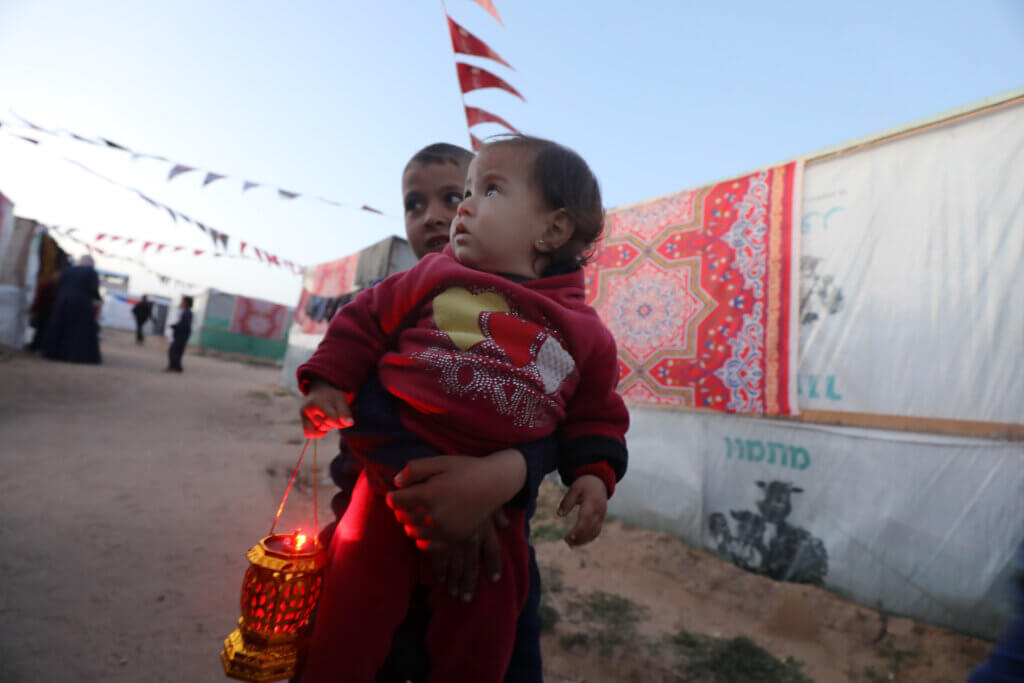
“This time of year is supposed to be the warmest and most beautiful,” Lina says. “My father invites all six of my sisters over with their husbands, and we have iftar together. And we all eat without fearing that the food will run out, or that we won’t be able to find anything the next day.”
“Now, the only thing on everyone’s mind today, at every moment of every day, is where we’re going to find our next meal,” Lina explains. “My children used to cry in Ramadan because I wouldn’t buy them a toy, and now they’re crying because they’re hungry. Yesterday, I entered my neighbor’s house, and I saw two of her children lying down on the floor, which was strange because it was cold. And I saw them moan. They weren’t even crying, they just moaned. When I asked their mother what was wrong with them, she said they hadn’t eaten in two days.”
Lina explains that her home was partially destroyed during the bombing campaign, and several of the rooms in the house had collapsed in on themselves, but the rest of the house remained standing. Every other building on her block was decimated, and at night, everything was pitch black. The number of people left in the neighborhood is few, and Lina says that during the worst days of the bombing, the artillery shells had wrought almost as much destruction as the airstrikes. It seemed like every single building in northern Gaza had been torn up by the shells.
“But none of this scared us. We withstood all of it,” Lina maintains. “We would just go from one place to another to escape the bombing. But it didn’t scare us into leaving, and we were always determined to go back to our home, even if it was only rubble.”
“But the hunger is what is giving us pause now,” Lina continues “I felt that my two children were dying slowly in front of my eyes. For me, death is better than seeing my child go through that. So if it gets to a point that we actually can’t find a single thing to eat, I will take my family and leave, and we’ll join our relatives in the south.”
But the prospect of fleeing to Rafah is equally daunting, especially in light of the increased likelihood of a final Israeli ground invasion of the Strip’s southernmost district. Lina knows all too well what an Israeli ground invasion looks like, and she does not wish to witness the savagery that she saw during the previous invasion of the north.
‘The people have been left to die’
Ghazi Oweis, Lina and Dina’s father, sits in front of his tent in Rafah city, where he and the other part of the family have sought refuge. He has just finished breaking his fast with his family of eleven people. All of them had been crammed into a single tent. Oweis tells Mondoweiss that he feels like he’s lost a limb.
“My family has been torn apart,” he laments. “Four of my daughters are still in Gaza City, and only two fled south with their husbands.”
He also says that he misses their Ramadan feasts. He misses qatayef, the traditional Ramadan sweet of semolina pancakes stuffed with walnuts or sweet cheese and dipped in sugar syrup. “I used to feed a huge number of people. Coffee and sweets would always be on hand,” he smiles. “Now our family eats a few cans of luncheon meat and some hummus and bread.”

“The most we feel during Ramadan is hunger. But that’s the heart of Ramadan, to feel with those who do not have enough to eat,” he reflects. “We don’t have many options to choose from here in the south, but it’s enough to keep us alive.” Unlike the north, where his daughters cannot find a similar meal.
In front of his tent in Tal al-Sultan, on the border, Ghazi points to Egypt. “This is the border. If the hundreds of trucks waiting to deliver food were allowed in all at once, it wouldn’t take more than an hour,” he says. “But there are those who claim that they want to help us, but keep waiting for us to die as they say it.”
“The truth can’t be hidden any longer. And that truth is that the people have been left to die,” Ghazi says. “Even during the holy month of Ramadan, the month of mercy. People fast without the promise of breaking it, and the world watches on without doing anything.”
Tareq S. Hajjaj
Tareq S. Hajjaj is the Mondoweiss Gaza Correspondent, and a member of the Palestinian Writers Union. He studied English Literature at Al-Azhar University in Gaza. He started his career in journalism in 2015 working as a news writer and translator for the local newspaper, Donia al-Watan. He has reported for Elbadi, Middle East Eye, and Al Monitor. Follow him on Twitter at @Tareqshajjaj.
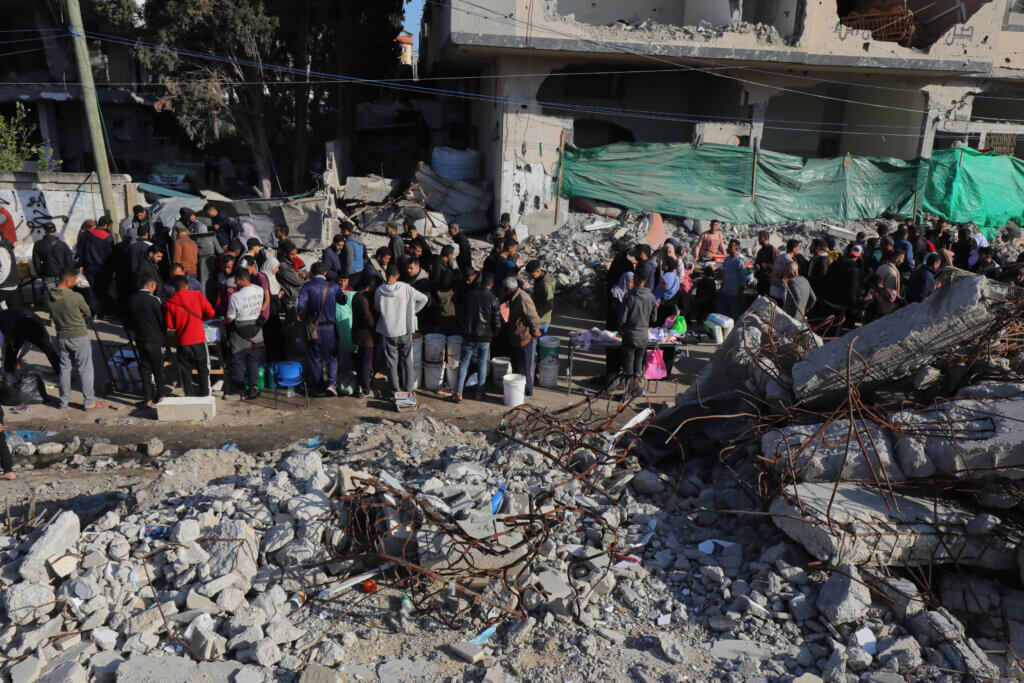
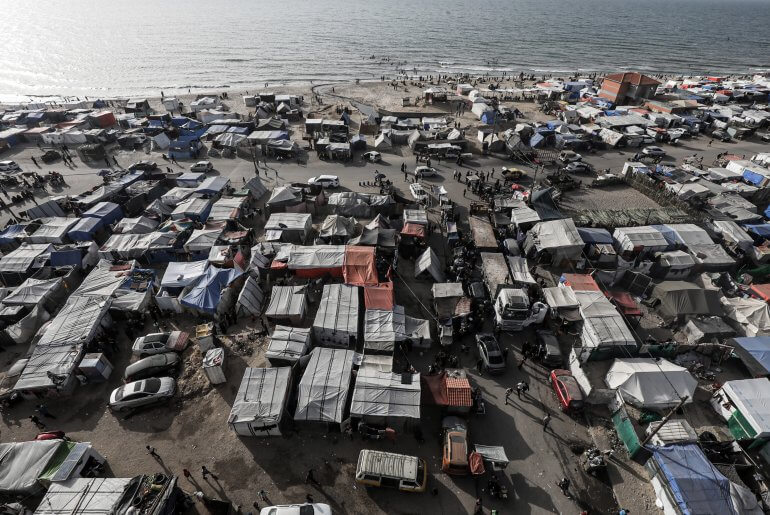
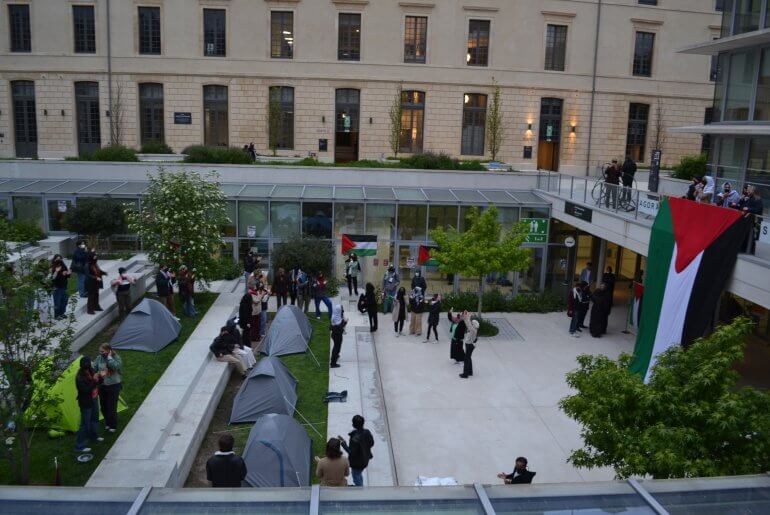
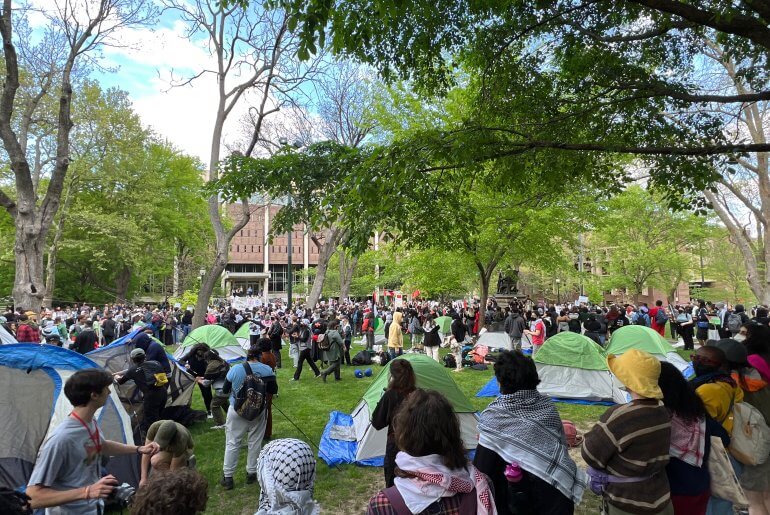
By way of deception, shameless lies, and the support of America, the nation now facing genocidal charges, has shown the world they can be defy international laws, and act with shocking savagery and ruthlessness, when it comes to those THEY have forcibly kept inside a concentration camp, blocking, and rejecting, every opportunity to give them their freedom, rights, and most importantly their own Palestinian state, something that is owed to them, and long overdue.
The despicable zionists deceived the world, especially Americans, by making Hamas the aggressor, and that poor little Israel had to constantly defend itself, and using Hamas, they were able to convince the world, that ALL Palestinians were “terrorists”, but now it turns out the world has opened its eyes, and can see who the BIGGER terrorist is, who the real aggressor is, and who has savagely killed MORE civilians, especially children. The numbers, and the scale of the violence, that keeps shocking the world, on a daily basis, tells the story.
It was all a big hoax, a zionist scam, and the US, UK, and the EU, knows this, but has unwaveringly funded this colonial settler project, and handed them the bombs and weapons to control, steal, and slaughter.
“For years, Netanyahu propped up Hamas. Now it’s blown up in our facesThe premier’s policy of treating the terror group as a partner, at the expense of Abbas and Palestinian statehood, has resulted in wounds that will take Israel years to heal fromFor years, the various governments led by Benjamin Netanyahu took an approach that divided power between the Gaza Strip and the West Bank — bringing Palestinian Authority President Mahmoud Abbas to his knees while making moves that propped up the Hamas terror group.
The idea was to prevent Abbas — or anyone else in the Palestinian Authority’s West Bank government — from advancing toward the establishment of a Palestinian state.
Times of Israel